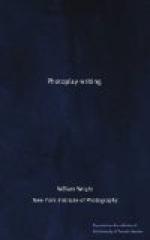There is a distinction, with a very decided difference, between the picture that fills the spectators with gloom and the one that simply allows them to have what many women would call “a good cry.” “It is a great thing to be able to lift the spectators out of their seats with a big, gripping melodrama,” remarks Mr. Sargent, “but it is a far more creditable thing to send them home with a tear in their eyes while a smile hovers about their lips.”
4. The Use of Deadly Weapons
It is understood, of course, that the use of guns, knives, and other weapons is seldom objected to by the censors when they are employed in a historical picture, or one that shows pioneer life. The trouble is that some young writers, knowing that they are granted more license in this direction when doing “Western stuff,” make the mistake of abusing this liberty. Mr. R.R. Nehls, of the American Film Company, says: “The most noticeable fault with manuscripts dealing with Western life is the natural inclination to run too much to gun play, stagecoach robberies, etc. Please remember that we do not wish to distort conditions in the great West—rather we seek to portray it as it really exists today.”
Mr. Nehls, it will be noticed, says “the great West ... as it really exists today.” It should be apparent to any writer that in turning out stories of the present-day West there is even less excuse for promiscuous gun-play than in a story, say, of California in the days of the Forty-Niners. But Indian massacres, soldier warfare, Indian and cowboy fights, usually come under the head of “historical” subjects and are therefore permissible.
5. Plays Offensive to Classes of Patrons
It seems scarcely possible that any intelligent photoplay writer would introduce into one of his stories an incident calculated to offend the religious or political faith of any patron, and yet in the past different pictures of this kind have been the cause of more than one unthinking moving-picture theatre manager’s losing some of his best patrons. People as a rule have no objection to being preached to in a mild and entertaining way when they go to a picture show, but they do object to having their feelings hurt. A man who is over-fond of drink may sit through a play on the screen in which the evil results of intoxication are depicted and come away filled with a determination to reform his way of living, but the man who after paying his admission is asked to sit through five or more reels of film almost every foot of which is a shock to his religious or his political sensibilities will come away filled only with the determination to avoid that theatre in the future, if not, indeed, to eschew moving-pictures entirely.




